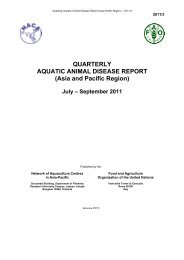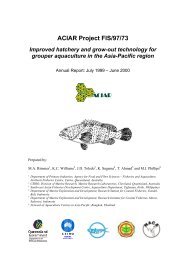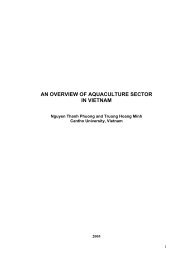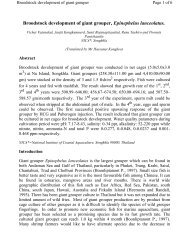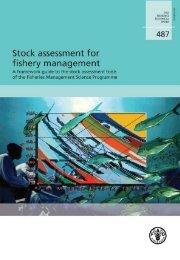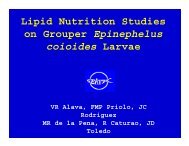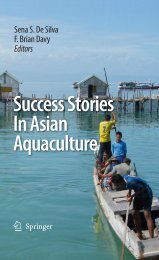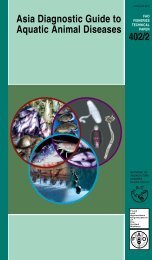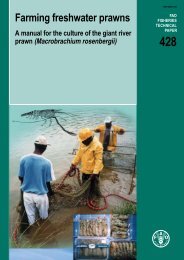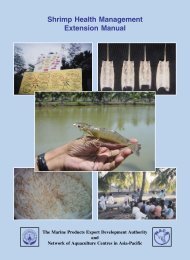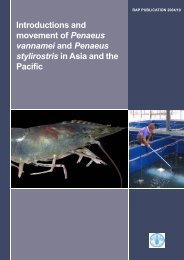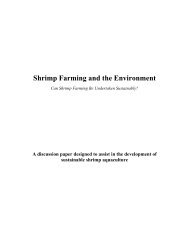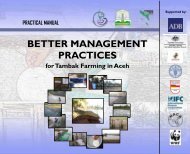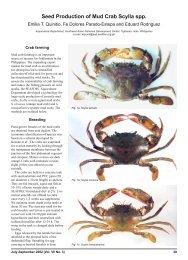Gender balanced staff recruitment is another key issue that needs to be considered and encouraged. In manyGovernments, there are very few women staff and <strong>in</strong> several cases, even when there are women staff, they arema<strong>in</strong>ly based <strong>in</strong> the Head Office <strong>of</strong> the Government and assigned with paper work. <strong>Aquaculture</strong> developmentwould see greater success when there are gender sensitive staff <strong>in</strong> the field. In Philipp<strong>in</strong>es, Thailand and Vietnamwhere<strong>in</strong> women staff constitute significant percentage <strong>in</strong> the Department are also confronted with manychallenges. Here too, women recognize the gender sensitization <strong>of</strong> staff as the key necessity and field problemsare not addressed due to lack <strong>of</strong> gender sensitive adm<strong>in</strong>istration.Lessons learned and good practices:(a) <strong>Aquaculture</strong> is a powerful tool to alleviate poverty, improve nutrition <strong>of</strong> the family and improve the overalllivelihood <strong>of</strong> the family when used wisely with respect to environment and focus on gender issues (Vimala,et.al., 2004; Nandeesha, 2004).(b) Indigenous knowledge, culture and traditions should be respected. However, by analyz<strong>in</strong>g the localculture and traditions from the global perspective and <strong>in</strong>troduc<strong>in</strong>g changes gradually after ga<strong>in</strong><strong>in</strong>g thecommunity confidence, it is possible to change the cultural practices that impede <strong>in</strong> br<strong>in</strong>g<strong>in</strong>g genderequality (Debashish, et.al., 2001).(c) By us<strong>in</strong>g family approach <strong>in</strong> tra<strong>in</strong><strong>in</strong>g and <strong>in</strong>tervention, it is possible to <strong>in</strong>crease productivity andsusta<strong>in</strong>ability. In all tra<strong>in</strong><strong>in</strong>g programs, make sure that both men and women are <strong>in</strong>cluded <strong>in</strong> the tra<strong>in</strong><strong>in</strong>g.While men can participate <strong>in</strong> tra<strong>in</strong><strong>in</strong>gs easily, tra<strong>in</strong><strong>in</strong>gs focused on women should have flexibleapproaches and such tra<strong>in</strong><strong>in</strong>gs should be held close to their residences (Nandeesha, 2004).(d) In many countries, literacy rate is low and particularly that <strong>of</strong> women. Hence, <strong>in</strong> tra<strong>in</strong><strong>in</strong>g programs, focusshould be on learn<strong>in</strong>g by do<strong>in</strong>g and use <strong>of</strong> as many tactile tools as possible. On farm tra<strong>in</strong><strong>in</strong>g <strong>in</strong> realpractical situation would be most useful (Kibria, 2004).(e) Credit is a useful component to promote good aquaculture practices. Provision <strong>of</strong> credit without tra<strong>in</strong><strong>in</strong>ghas not benefited aquaculture. Recovery rate from women be<strong>in</strong>g almost cent percent <strong>in</strong> most cases, mostcredit programs target women to provide credit. However, when credit providers ensure that women takecontrol <strong>of</strong> the <strong>in</strong>come earned from aquaculture, there is greater empowerment impact seen (Nathan andApu, 1998; Shelly, et.al., 2001).(f) Projects should facilitate people to assess their own risks and determ<strong>in</strong>e their own levels <strong>of</strong> <strong>in</strong>vestment,use <strong>of</strong> external <strong>in</strong>puts on both on farm and <strong>of</strong>f farm.(g) Utilization <strong>of</strong> participatory approaches provide greater opportunities for the development <strong>in</strong>terventions tosucceed.Monitor<strong>in</strong>g and Evaluation Indicators:Some simple monitor<strong>in</strong>g and evaluation <strong>in</strong>dicators to measure women participation <strong>in</strong> small-scaleaquacultureIndicatorsPercentage <strong>of</strong> women <strong>in</strong> tra<strong>in</strong><strong>in</strong>g programsVariety <strong>of</strong> tra<strong>in</strong><strong>in</strong>g tools used <strong>in</strong> tra<strong>in</strong><strong>in</strong>gLevels <strong>of</strong> utility on-farm and <strong>of</strong>f farm resourcesImprovement <strong>in</strong> general nutritional well-be<strong>in</strong>g <strong>of</strong>lactat<strong>in</strong>g women, girls <strong>in</strong> puberty and well be<strong>in</strong>g<strong>of</strong> boysDegree <strong>of</strong> women participation <strong>in</strong> aquacultureAccess to the resources generatedSources <strong>of</strong> verification toolsRecords <strong>of</strong> attendanceNumber <strong>of</strong> tactile tools developed, videos, used<strong>in</strong> the tra<strong>in</strong><strong>in</strong>gBio-resource map and culture recordsMeasurement <strong>of</strong> weight; amount <strong>of</strong> fishconsumed; measurement <strong>of</strong> upper arm radius;eye sight, etcBy measur<strong>in</strong>g their perception percentagePerception measurement <strong>of</strong> women and thecommunity139
Overall status <strong>of</strong> men and women <strong>in</strong> the familyon the gender sensitive aquaculture practicespromoted.Community perception on the benefits derivedby women <strong>in</strong> terms <strong>of</strong> access to the resourcesgeneratedMen: Very happy / happy /UnhappyWomen: Very happy / happy /UnhappyParticipatory discussionConclusionDevelopment projects must make conscious efforts to empower women through the program. Empowerment willoccur only when women are given additional skills and the necessary support to utilize the skills to generate<strong>in</strong>come. Keep<strong>in</strong>g this <strong>in</strong> view, under the ASEAN project, efforts should be made to ensure participation <strong>of</strong> women<strong>in</strong> the project activities and build their knowledge and skills by understand<strong>in</strong>g their needs. The monitor<strong>in</strong>g andevaluation <strong>in</strong>dicators suggested above can be used as guidel<strong>in</strong>es to make <strong>in</strong>terventions.ReferencesBhujel, R. & Pant, J. 2004. Progress on ‘Women <strong>in</strong> <strong>Aquaculture</strong>’ project <strong>in</strong> Nepal. ARRM Newsletter 6(2-3): 13-14.Bhujel, R.C., Shresta, M.K., Pant, J and Buranrom, S. 2008. Ethnic women <strong>in</strong> aquaculture <strong>in</strong> Nepal. Development,51: 259-264,Choo, P.S, Hall, S.J. and Williams, M.J. 2006. Global Symposium on Gender and Fisheries: Seventh AsianFisheries Forum, 1-2 December, 2004, Penang, Malaysia. Worldfish Center, 174p.Fels<strong>in</strong>g, M., Brugere, C, Kusakabe, K and G. Kelkar. 2000. Women for aquaculture or aquaculture for women.Inf<strong>of</strong>ish International No. 3. 34-40.Kusakabe, K. 2003. Women’s <strong>in</strong>volvement <strong>in</strong> small scale aquaculture <strong>in</strong> Northeast Thailand. DevelopmentPractice, 13(4): 333-345.Kusakabe, K., Korsieporn, A and U. Suntornratana. 2003. Gender and technology transfer <strong>in</strong> freshwateraquaculture: women’s access to <strong>in</strong>formation <strong>in</strong> Northeast Thailand. Asian Institute <strong>of</strong> Technology, Bangkok,Thailand. 50p.Kusabe, K. & Kelkar G. 2001. Gender Concerns <strong>in</strong> <strong>Aquaculture</strong> <strong>in</strong> Southeast Asia. Gender Studies Monograph 12,Gender and Development Studies, School <strong>of</strong> Environment Resources and Development, Asian Institute <strong>of</strong>Technology, Bangkok, Thailand.Mbozi, E.H. 1991. Integration <strong>of</strong> gender issues <strong>in</strong>to fish farm<strong>in</strong>g <strong>in</strong> Chibote, Zambia. <strong>Aquaculture</strong> for LocalCommunity Development Programme (ALCOM) Field Document No. 17. Harare, FAO.Murray, U , Sayasane, K and Funge-Smith, S. 1998. Gender and aquaculture <strong>in</strong> Lao PDR.: A synthesis <strong>of</strong> a socioeconomicand gender analysis <strong>of</strong> the UNDP/FAO aquaculture development project LAO/97/007. FAO, Bangkok.40 p.Nathan, D and Apu, N.A. 1998. Women’s <strong>in</strong>dependent access to productive resources: fish ponds <strong>in</strong> the Oxbowlakes project, Bangladesh. Gender, Technology and Development 2(3): 397-413.Nash, C.E., Engle, C.R. & Crosetti, D. 1987. Women <strong>in</strong> aquaculture. Proceed<strong>in</strong>gs <strong>of</strong> the ADCP/NORAD Workshopon Women <strong>in</strong> <strong>Aquaculture</strong>, Rome, FAO, 13-16 April. FAO Document ADCP/REP/87/28. Rome, FAO.140
- Page 1 and 2:
Training of TrainersProgramme3-7 Au
- Page 3 and 4:
Table of Contents1. Preface 42. Sen
- Page 5 and 6:
knowledge about the activities carr
- Page 7 and 8:
iosphere, in that it is essentially
- Page 10 and 11:
Importance in narrowing the supply
- Page 12 and 13:
Figure 7: The trend in aquaculture
- Page 14:
aquaculture has been a success thus
- Page 17 and 18:
pathogen transfer is generally cons
- Page 19 and 20:
• It highlights the importance a
- Page 21 and 22:
particular animal are identified, t
- Page 23:
Knowledge at the bottom of the pyra
- Page 26 and 27:
farmer innovation process. In this
- Page 28 and 29:
• Rapport building• Working str
- Page 30 and 31:
shrimp farming is undertaken in the
- Page 32 and 33:
Reintjes, C and Hiemstra, W. 1989 F
- Page 34 and 35:
• An increase in reliable product
- Page 36 and 37:
Principles of AACC are to: 1) Facil
- Page 38 and 39:
Maintaining genetic quality of fish
- Page 40 and 41:
Where F is the percent increase in
- Page 42 and 43:
o G=(0.95) 1/10G =0.994883803Figure
- Page 44 and 45:
Aquaculture extension and training
- Page 46 and 47:
ResearchExtensionFarmersFlow of inf
- Page 48 and 49:
view of outside world than before a
- Page 50 and 51:
Along with fish sample, the support
- Page 52 and 53:
Fungal examinationFungal infection
- Page 54 and 55:
few different pathogen strains. The
- Page 56 and 57:
Major finfish diseases in Asia and
- Page 58 and 59:
A great number and diversity of ani
- Page 60 and 61:
• -oxidase test positive• -resi
- Page 62 and 63:
ReferencesAustin, B. and D. Austin.
- Page 64 and 65:
Accessing better markets-improving
- Page 66 and 67:
Owing to its importance in generati
- Page 68 and 69:
adopt standards for responsible shr
- Page 70:
Tokrisna R, Benheam W., 1995. Gain
- Page 73 and 74:
of the temperature rise that were d
- Page 75 and 76:
Principles of developing, validatin
- Page 77 and 78:
such as determinants, exposures and
- Page 79 and 80:
How to promote adoption of BMPs?Pro
- Page 81 and 82:
economic sustainability. BMPs need
- Page 83 and 84:
Once you understand your stakeholde
- Page 85 and 86:
As conventional approaches such as
- Page 87 and 88:
Printed publicationsPrinted publica
- Page 89 and 90: Set up a blog or website for your w
- Page 91 and 92: If you have a website, all you need
- Page 93 and 94: ought about increased profits among
- Page 95 and 96: • It is a farming system the prod
- Page 97 and 98: Annex 1. The area surveyed for obta
- Page 99 and 100: contribute substantially to maintai
- Page 101 and 102: seawater, but in fresh water its le
- Page 103 and 104: type of ingredients used, since som
- Page 105 and 106: This is a new approach used to buil
- Page 107 and 108: New, M.B., A. G. J. Tacon and I. Cs
- Page 109 and 110: later stages it has become a much m
- Page 111 and 112: c. Improved information exchange an
- Page 113 and 114: implemented by both societies. Inte
- Page 115 and 116: With better informed farmers, the s
- Page 117 and 118: According to FAO, it is estimated t
- Page 119 and 120: Farmer organization as models for p
- Page 121 and 122: NaCSA disseminates BMPs mainly thro
- Page 123 and 124: 1. Drain the pond water completely
- Page 125 and 126: Seed transportation and Stocking:
- Page 127 and 128: 7. Presently 100% of the society po
- Page 129 and 130: would help in sustaining shrimp sec
- Page 131 and 132: Stress brought about by the capture
- Page 133 and 134: Enhance women participation in aqua
- Page 135 and 136: women in aquaculture and identify a
- Page 137 and 138: major percentage of staff, the need
- Page 139: having more self confidence through
- Page 143 and 144: Compliance to international standar
- Page 145 and 146: (ii) to protect human or animal lif
- Page 147 and 148: c) FAO/WHO Codex Alimentarius Commi
- Page 149 and 150: Annex 1: List of participantsCountr
- Page 151 and 152: Annex 2: AgendaDate Time Presentati
- Page 153: Annex 3: List of resource persons1.



